Terry Ann Thaxton approaches her third book of poetry, Mud Song, with a native Floridian’s familiarity. We know about Florida oranges, alligators, and hurricanes, and she doesn’t ignore these attributes, but there’s a lot more of Florida in her book that won the 2017 T. S. Eliot Prize for Poetry.
NewPages Blog
At the NewPages Blog readers and writers can catch up with their favorite literary and alternative magazines, independent and university presses, creative writing programs, and writing and literary events. Find new books, new issue announcements, contest winners, and so much more!
Mud Song
Spread the word!
Peluda
Okay, ready? Would you rather be completely covered in fur, like, head-to-toe, monster type of shit or, stay with me, stay with me, be completely smoothie-smooth in all of the right places: thighs, crotch, armpit, upper lip, neck?
— from “We Play Would You Rather at the Galentine’s Day Party”
Spread the word!
Books :: 2017 Autumn House Press Contest Winners
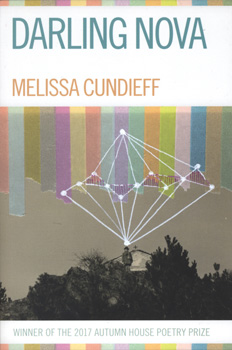 Autumn House Press annually hosts contests for full-length manuscripts of fiction, nonfiction, and poetry. Each winner receives publication, and $2,500 ($1,000 advance against royalties and $1,500 for travel and publicity). The 2017 winners will be available for purchase next month.
Autumn House Press annually hosts contests for full-length manuscripts of fiction, nonfiction, and poetry. Each winner receives publication, and $2,500 ($1,000 advance against royalties and $1,500 for travel and publicity). The 2017 winners will be available for purchase next month.
In fiction, Glori Simmons’s Carry You, selected by Amina Gauthier, is an intense read, a linked collection of intertwined stories. Advance praise calls the collection gorgeous, moving, and deeply empathetic.
Dickson Lam’s memoir Paper Sons was selected by Alison Hawthorne Deming. Paper Sons combines memoir and cultural history, violence marking the story at every turn. Deming calls the book important and “beautifully crafted, rich in poetic image and juxtapositions.”
Alberto Ríos selected Darling Nova by Melissa Cundieff as the poetry 2017 poetry winner. The collection makes “new connections, new sparks, new thoughts as often as line to line,” and covers “grief, love, humanness,” moving readers.
While you’re learning more about the 2017 prize winners, be sure to stop by the contest submission guidelines: entries are now open until the end of June.
Spread the word!
Books :: 2017 Lena-Miles Wever Todd Prize Winner Published
 Available this month is the winner of the 2017 Lena-Miles Wever Todd Prize for Poetry: Bridled by Amy Meng. Selected by Jaswinder Bolina, Bolina says of his selection:
Available this month is the winner of the 2017 Lena-Miles Wever Todd Prize for Poetry: Bridled by Amy Meng. Selected by Jaswinder Bolina, Bolina says of his selection:
Bridled is poetry as slow-burn opera. [ . . . ] The poems here offer, in reverse chronology, the story of a crumbling relationship between an unnamed speaker and her nameless ‘lover.’ In this telling, Bridled articulates a politics of self versus other, of body and gender, of loneliness and togetherness. It’s a collection you’re going to want to read from start to finish and then from finish to start.
A Kundiman Fellow and poetry editor at Bodega Magazine, this is Amy Meng’s first collection. Stop by the Pleaides Press website to learn more.
Spread the word!
Glimmer Train Nov/Dec 2017 Very Short Fiction Winners
Glimmer Train has just chosen the winning stories for their 2017 November/December Very Short Fiction Award. This competition is held three times a year and is open to all writers for stories with a word count under 3000. The next Very Short Fiction competition will take place in March 2018. Glimmer Train’s monthly submission calendar may be viewed here.
 1st place goes to Corey Flintoff [pictured] of Cheverly, Maryland, who wins $2000 for “Early Stages.” His story will be published in Issue 103 of Glimmer Train Stories. This will be his first major print publication.
1st place goes to Corey Flintoff [pictured] of Cheverly, Maryland, who wins $2000 for “Early Stages.” His story will be published in Issue 103 of Glimmer Train Stories. This will be his first major print publication.
2nd place goes to Irene Doukas Behrman of Portland, Oregon, who wins $500 for “Permission.”
3rd place goes to Itoro Udofia of Oakland, California, who wins $300 for “To the Children Growing Up in the Aftermath of Their Parents’ War.”
Here’s a PDF of the Top 25.
Deadline soon approaching! Short Story Award for New Writers: February 28
This competition is held three times a year and is open to all writers whose fiction has not appeared in a print publication with a circulation over 5000. No theme restrictions. Most submissions to this category run 1000-4000 words, but can go up to 12,000. First place prize wins $2500 and publication in Glimmer Train Stories. Second/third: $500/$300 and consideration for publication. Click here for complete guidelines.
Spread the word!
Lit Mag Covers :: Picks of the Week
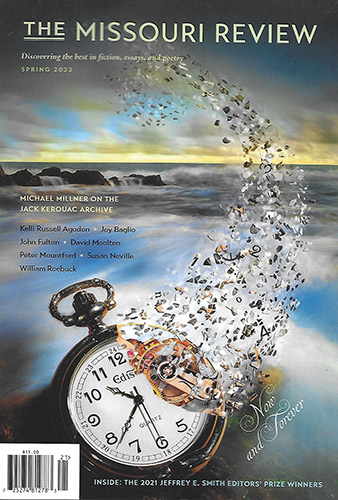
The Missouri Review v40 n4, 2017 features intriguing cover art by Su Blackwell entitled “Heroines of Literature,” a finely crafted paper sculpture. More of Blackwell’s work can be viewed on her website.

According to Editor and Founder Robert Stapleton, Booth 11 is a “stunning collection of contemporary femal writers. The issue includes new fiction, nonfiction, poetry comics, lists, and interviews by such esteemed authors as Emily St. John Mandel, Joyce Carol Oates, Marya Hornbacher, Elizabeth Strout, Krista Christensen, Aubrey Hirsch, Brenda Shaughnessy, and so many more. This full-color literary journal offers a powerful argument for the strength of female authors working in American letters.” Beginning it all: cover art by Tara McPherson.
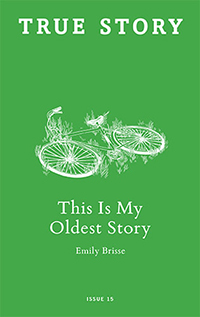 The cover image by Lucy Engelman made me open Issue 15 of Creative Nonfiction’s monthly publication, True Story, the opening paragraph of “This Is My Oldest Story” by Emily Brisse made me drop everything and just read. It begins: “In May of 1992, a little before the end of fourth grade, my best friend Kristy and I and a few others from our street – Ryan, Tim, Tom, maybe Naomi – hopped on our bikes and started riding. Most of us had younger brothers, and we left them at home. We didn’t tell our parents we were going. They thought we were in the basement of Tim’s house, playing Tetris, and although their anxiousness had relaxed by inches over the past two and a half years, we knew that any request to bike farther than the outlined boundary of our street would receive a firm no. So we just went.”
The cover image by Lucy Engelman made me open Issue 15 of Creative Nonfiction’s monthly publication, True Story, the opening paragraph of “This Is My Oldest Story” by Emily Brisse made me drop everything and just read. It begins: “In May of 1992, a little before the end of fourth grade, my best friend Kristy and I and a few others from our street – Ryan, Tim, Tom, maybe Naomi – hopped on our bikes and started riding. Most of us had younger brothers, and we left them at home. We didn’t tell our parents we were going. They thought we were in the basement of Tim’s house, playing Tetris, and although their anxiousness had relaxed by inches over the past two and a half years, we knew that any request to bike farther than the outlined boundary of our street would receive a firm no. So we just went.”
Spread the word!
New Lit on the Block :: MORIA Literary Magazine
 Olives are a succulent fruit, each containing a seed with which to grow more nourishing deliciousness. What better inspiration, then, for MORIA, the new literary publication from Woodbury University, where an olive grove once stood on the land that now houses this Californian educational institution.
Olives are a succulent fruit, each containing a seed with which to grow more nourishing deliciousness. What better inspiration, then, for MORIA, the new literary publication from Woodbury University, where an olive grove once stood on the land that now houses this Californian educational institution.
Faculty Editor of MORIA Literary Magazine, Dr. Linda L. Dove, tells me MORIA refers to a special type of olive tree in ancient Greece that is protected by the government. “As a tree sacred to Athena, the goddess of wisdom, the original ‘Moria’ was believed to have been planted by her at the Parthenon and includes the meaning ‘to be part of’ something larger than itself. Here at the literary magazine, we recognize and celebrate that Woodbury University is a part of a tradition of learning that is larger than itself, just as literature and the writers who make it are part of a tradition of creative engagement and cultural production that is larger than any one individual alone.” Beautiful.
Continue reading “New Lit on the Block :: MORIA Literary Magazine”
Spread the word!
Malahat Review 2017 Prize Winners
The Malahat Review issue #201 (Winter 2017) includes two prize winning works:
 Far Horizons Award for Short Fiction
Far Horizons Award for Short Fiction
Selected by Steven Price
“Faster Horses” by Katherin Edwards
Constance Rooke CNF Prize
Selected by Brian Brett
“Flaubert’s Hummingbirds” by Nancy Holmes [pictured]
Read more about The Malahat Review prizes as well as interviews with each of the winners here.
Spread the word!
Question Everything Advises Danielle Lazarin
 In her craft essay in the February 2018 #133 issue of Glimmer Train’s Bulletin, Danielle Lazarin tells readers to “Question Everything” as she does in her own drafting process. Her essay opens:
In her craft essay in the February 2018 #133 issue of Glimmer Train’s Bulletin, Danielle Lazarin tells readers to “Question Everything” as she does in her own drafting process. Her essay opens:
“On some days, my writing notebooks look like an inquisition, my pages topped and ended with questions: in all-caps, underlined, circled. Many are small: What do the kids want to be called? What is her work? Handwriting=obsessive or careless? Maybe she cries on the subway home, after dinner? But they’re big, too: What is true, the memory of it, or the moment? Is she lacking? DO WE REQUIRE HOPE? Though they may appear frantic, a series of scribbled questions aren’t signs of confusion or desperation but of sufficient curiosity on my part to propel a story forward. At every stage of my work, questions are my most essential writing tools. I use them to move through to the other side of murky. It’s only by stepping into that unknown and uncomfortable space repeatedly during my process that I can become more deliberate in the story I’m telling.”
Also included in this month’s GT Bulletin are Thomas Fox Averill’s “Writing Archival Fiction” and Aline Ohanesian “On Rejection.” The Bulletin is free to read online and have delivered monthly to your e-mail.
Spread the word!
Lit Mag Covers :: Picks of the Week
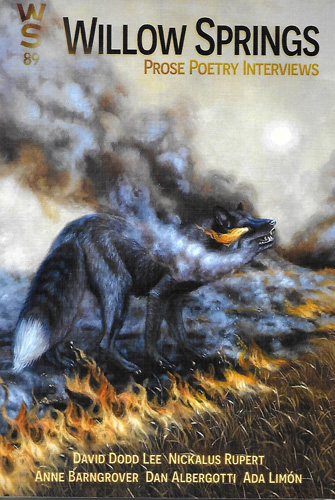
Willow Springs Issue 81 features this brightly colored image, originally a 13 x 13 silkscreen. The “inside cover” replicates this image, but with “Spokane Garbage Goat” replacing the issue number. I had no idea what this was, so promptly headed to Google, where I learned of the iconic status of said goat. Absolutely delightful, as is artist Chris Bovey’s work, more of which can be found at Vintage Prints.
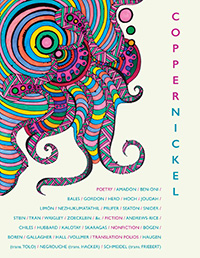
Rebecca Berlin’s marker on paper “Circles That You Find” brightens the cover of the Spring 2018 (#26) issue of Copper Nickel. See more of her work at Rebecca Berlin Art.

Keeping with vibrant colors, The Fiddlehead Winter 2018 (# 274) issue features Monika Wright’s “With Powerful Intention” acrylic on canvas. In her artist’s statement, Wright comments, “With organic shapes, fluid light, lines and circles, I am employing universal symbols of unity, wholeness and infinity connected by lines, representing the boundaries which separate us, but which also highlights our shared path.” See more of her work here.
Spread the word!
Prime Number Magazine – January/February 2018
The phrase “prime number” is one that generally gives me the chills, reminding me of past days of math classes and the frustration tied to them. However, Prime Number Magazine manages to have the opposite effect: it’s a fun and quirky online journal with a lot to offer readers.
Continue reading “Prime Number Magazine – January/February 2018”
Spread the word!
Geist – Fall 2017
I was pleasantly intrigued looking through this Fall 2017 issue of the Canadian literary magazine, Geist. Between the unique artwork and photographs, I found interesting poems, anecdotes of encounters with native peoples, and unique short stories, culminating in a cryptic crossword puzzle that I am compulsively returning to.
Spread the word!
The Healing Muse – Fall 2017
As a journal published by the Center for Bioethics and Humanities, The Healing Muse has a commitment to encouraging healthcare that is personal and compassionate. In a time when our access to healthcare in America is being regularly threatened, the work done by this journal is essential as ever. Featuring work that centers exclusively on the body and illness, The Healing Muse is a shining example of the power of medical humanities.
Spread the word!
Hiram Poetry Review – Spring 2017
The cover of Hiram Poetry Review’s 78th issue features a photo of two young men who look like they are turn of the century bohemians, one holding a mandolin in his hands, the other with an open book, neither looking into the camera or at each other. They look kind of baffled by their own existence, like they’re thinking about the passage of time. Maybe I’m projecting a little, but regardless, I felt it captured the themes of this edition nicely. The pieces in this edition seemed particularly interested in growing older and how we change or fail to change.
Spread the word!
Eleven Eleven – 2017
Issue 23 is notable for a number of reasons, including the departure of longtime Faculty Editor Hugh Behm-Steinberg—and what an exit it is. The current issue of Eleven Eleven (8” x 8” if you’re curious) is large, daring, fun, and occasionally a hot mess. Consistency is hard to achieve with student-run publications; editors are cycling out each year as new staff comes whirling in, and errors occasionally slip through the cracks. In most cases, the missed edits are those spellcheck would ignore—e.g. a “bowl” movement or a phrase in Latin “hat” translates—but others, like “Dega’s painting” (it should be Degas’ or Degas’s), remain unchanged too, unfortunate blemishes on otherwise pristine pages. Viewed separately, these missed edits are minor blips, but piled together (and there are plenty more), the issue is cheapened, and even the best pieces, impeccably written and edited as they may be, are done a disservice.
Spread the word!
2017 Able Muse Write Prize Winners
Winners and finalists for the 2017 Able Muse Write Prize for Poetry and Fiction are featured in the Winter 2017 issue of Able Muse: A Review of Poetry, Prose & Art.
 Write Prize for Fiction
Write Prize for Fiction
Final Judge: Jill Alexander Essbaum
Winner: “Target” by Leslie Jill Patterson
Write Prize for Poetry
Final Judge: Annie Finch
Winner: “Fall Rewinding” by D. R. Goodman [pictured]
Finalists: Ann M. Thompson; Scott Ruescher; Rob Wright
For a full list of honorable mentions and short list selections, visit the Able Muse 2017 Write Prize announcement page.
Spread the word!
The Florida Review Prison Focus

The Florida Review Editor and Director Lisa Roney in the 41.2/2017 issue Editor’s Note writes in a recurring thread about the U.S. prison culture, her early experiences knowing young people who went in and out of jail, and – of all things – changing the publication’s submission policy to accept traditional postal submissions from those without Internet access, “whatever the circumstances might be.” This, of course, would open submissions to our nation’s incarcerated population who are not allowed access to the Internet.
About the Special Section on Prison, Roney writes, “we include writing by prisoners, as well as their family members and friends. It is the presence of this Triumvirate (victims, prisoners, family and loved ones) that testifies to the widespread tragedy that violence, addiction, and poverty and their results have become in this country – and our constant sense that there must be some better way. Writing, of course, is one of those better ways.”
Spread the word!
2017 Gulf Coast Prize Winners
The Winter/Spring 2018 issue of Gulf Coast features the winners of their 2017 Gulf Coast Prizes contest:
 Poetry
Poetry
Judged by Cate Marvin
“The Weather Underground” by sam sax
Nonfiction
Judged by Diane Roberts
“The Peacock and the Bell Captain” by Spencer Wise
Fiction
Judged by Chinelo Okparanta
“That Boy Could Run” by Rudy Ruiz [pictured]
For a full list of honorable mentions and biographical information on each writer and judge, visit the Gulf Coast Prize page.
Spread the word!
ALA Intellectual Freedom Blog
 Intellectual Freedom Blog hosted by the Office for Intellectual Freedom, a unit of the American Library Association, provides “a venue for coverage of time-sensitive news in intellectual freedom and librarianship.” The topics, however, are of interest to a much wider audience, including writers, readers, and academics – teachers, students, and administrators. Recent post titles include: “Is There a Connection Between Mental Health and Intellectual Freedom?” by Allyson Mower; “‘The Post,’ the Pentagon Papers, and the Era of Fake News” by Robert Sarwark; “Xicanas/Latinas and Intellectual Freedom in College: When Reading is Political” by Eva Rios-Alvarado; “Reading as a Mirror: Banning the New Jim Crow in New Jersey Prisons” by Jane’a Johnson [pictured]; and weekly roundups of Intellectual Freedom News.
Intellectual Freedom Blog hosted by the Office for Intellectual Freedom, a unit of the American Library Association, provides “a venue for coverage of time-sensitive news in intellectual freedom and librarianship.” The topics, however, are of interest to a much wider audience, including writers, readers, and academics – teachers, students, and administrators. Recent post titles include: “Is There a Connection Between Mental Health and Intellectual Freedom?” by Allyson Mower; “‘The Post,’ the Pentagon Papers, and the Era of Fake News” by Robert Sarwark; “Xicanas/Latinas and Intellectual Freedom in College: When Reading is Political” by Eva Rios-Alvarado; “Reading as a Mirror: Banning the New Jim Crow in New Jersey Prisons” by Jane’a Johnson [pictured]; and weekly roundups of Intellectual Freedom News.
Spread the word!
The Massachusetts Review: More than a Lit Mag
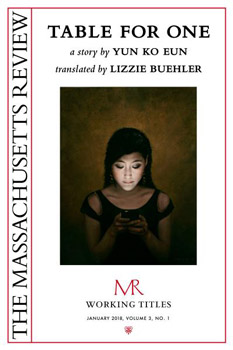 Readers may already be familiar with The Massachusetts Review, the quarterly print journal founded in 1959, but did you know they also have digital projects available?
Readers may already be familiar with The Massachusetts Review, the quarterly print journal founded in 1959, but did you know they also have digital projects available?
Working Titles are e-publications of prose which are too long to be printed in the quarterly. Published bimonthly, there are three ways to purchase and download Working Titles. Recent publications include Table for One by Yun Ko Eun translated by Lizzie Buehler, The Keepers of the Ghost Bird by Jenn Dean, The Leader by Nouri Zarrugh, and more.
Readers can also find Digital Chapbooks, showcasing art and poetry from past special sections and art inserts throughout the years of the journal. These features are free to read and easy to access, a good way to spend some time.
While you’re checking out the current “Truth” issue of The Massachusetts Review, be sure to see what digital offerings are up for grabs.
Spread the word!
The Real Life of the Parthenon
Patricia Vigderman’s book, The Real Life of the Parthenon, appealed to me because, like her, I’d walked up to the Acropolis in Athens, Greece. My walk was during a honeymoon, hers—for the most part—were more empirical.
Spread the word!
The Amazing Mr. Morality
The Amazing Mr. Morality is a collection that dives head first into the shallow end of a pool full of ethical dilemmas. Jacob M. Appel creates wild worlds just inches beyond reality, but still close enough to the real deal that you can absolutely imagine them coming true. The writing is sharp, the characters are witty, and the stories are original.
Spread the word!
The Stargazer’s Embassy
Eleanor Lerman began her writing career at twenty-one as a poet, branching out over the years into short stories and novels while winning prizes along the way. Her latest book is a suspense-filled science fiction novel called The Stargazer’s Embassy.
Spread the word!
Marvels of the Invisible
“Another endangered syntax descends.” —from “Echolocations”
If ex-poet-laureate Billy Collins is correct in saying that poetry is “everyday moments caught in time,” then Jenny Molberg’s debut collection The Marvels of the Invisible, winner of 2014 Berkshire Prize, is exemplar. As if flipping through a family album, Molberg covers a personal history from birth to death, hospital and bible, family and landscape, hope and redemption.
Spread the word!
This Must Be the Place
At times in life, we dive in, ready for action. At other times, often in transitional phases, we hang back and observe, browsing through possible lives and paths we might pursue.
Spread the word!
American Life in Poetry :: Connie Wanek
American Life in Poetry: Column 670
BY TED KOOSER, U.S. POET LAUREATE
I’m writing this column on a very cold day, and it’s nice to be inside with a board game to play, but better yet, for me at least, to be inside with a poem about a board game. This Monopoly game by Connie Wanek is from her book Rival Gardens: New and Selected Poems from the University of Nebraska Press.
Monopoly
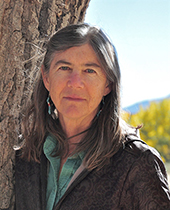 We used to play, long before we bought real houses.
We used to play, long before we bought real houses.
A roll of the dice could send a girl to jail.
The money was pink, blue, gold, as well as green,
and we could own a whole railroad
or speculate in hotels where others dreaded staying:
the cost was extortionary.
At last one person would own everything,
every teaspoon in the dining car, every spike
driven into the planks by immigrants,
every crooked mayor.
But then, with only the clothes on our backs,
we ran outside, laughing.
We do not accept unsolicited manuscripts. American Life in Poetry is made possible by The Poetry Foundation (www.poetryfoundation.org), publisher of Poetry magazine. It is also supported by the Department of English at the University of Nebraska, Lincoln. Poem copyright ©2016 by Connie Wanek, “Monopoly,” from Rival Gardens: New and Selected Poems (Univ. of Nebraska Press, 2016). Poem reprinted by permission of Connie Wanek and the publisher. Introduction copyright ©2017 by The Poetry Foundation. The introduction’s author, Ted Kooser, served as United States Poet Laureate Consultant in Poetry to the Library of Congress from 2004-2006.
Spread the word!
Bennington Review is Staying Alive
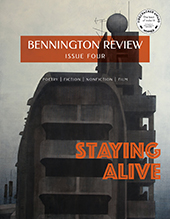 I was relieved to see it wasn’t just me who heard the Bee Gees in my head when I saw the cover of Bennington Review Issue Four themed “Staying Alive.” Editor Michael Dumanis opens the “Note from the Editor” with these two lines from the 1977’s classic, “Life goin’ nowhere, somebody help me / Somebody help me, yeah, I’m stayin’ alive.”
I was relieved to see it wasn’t just me who heard the Bee Gees in my head when I saw the cover of Bennington Review Issue Four themed “Staying Alive.” Editor Michael Dumanis opens the “Note from the Editor” with these two lines from the 1977’s classic, “Life goin’ nowhere, somebody help me / Somebody help me, yeah, I’m stayin’ alive.”
Dumanis explains, “As we were reading the poems, stories, and essays submitted to Bennington Review in 2017 for this, our fourth issue, we noticed a word that come up with remarkable regularity – the verb ‘survive’ in all its various permutations. In Issue Four, it occurs – frequently as a directive, occasionally as the noun ‘survivor’ – twenty-eight times. The word ‘living’ can be found twenty-one times, an the word ‘alive’ shows up an additional twelve.”
A “tonal shift” from their previous issue, themed “Threat,” Dumanis notes that “something has shifted in the cultural landscape. An acceptance of threat has bred a series of reactions – resistance, perseverance, even a measure of optimism . . . there’s now a restored sense of agency.”
Readers can find works by Patrick Williams, Erin L. McCoy, Marco Wilkinson, Ian Stansel, A. Molotkov and many more, with several contributors’ works available to read online.
Stayin’ alive? I’m all for it.
Spread the word!
Brevity Craft Essays
 In addition to its regular content of ‘extremely brief’ (under 750 words) nonfiction, Brevity‘s regular feature of Craft Essays in its first issue of 2018 features Chelsey Dyrsdale’s “Transforming an Essay Collection into a Memoir,” Annelise Jolley’s “Capturing the Numinous: Mary Karr’s Sacred Carnality,” and Felicia Rose Chavez’s [pictured] “The Mental Load: Honoring Your Story Over Your To-Do List.” All of Brevity‘s content is available online for free. No reason not to stop on by.
In addition to its regular content of ‘extremely brief’ (under 750 words) nonfiction, Brevity‘s regular feature of Craft Essays in its first issue of 2018 features Chelsey Dyrsdale’s “Transforming an Essay Collection into a Memoir,” Annelise Jolley’s “Capturing the Numinous: Mary Karr’s Sacred Carnality,” and Felicia Rose Chavez’s [pictured] “The Mental Load: Honoring Your Story Over Your To-Do List.” All of Brevity‘s content is available online for free. No reason not to stop on by.
Spread the word!
Interview :: The Godfather – of Nonfiction – Speaks
 In “The Godfather Speaks,” 3QR: The Three Quarter Review interviewed Lee Gutkind on the two-decade anniversary of the controversial Vanity Fair article, in which critic James Wolcott “accused creative nonfiction writers, of memoir in particular, of ‘navel gazing’ . . . lambast[ing] the form itself as: a ‘sickly transfusion, whereby the weakling personal voice of sensitive fiction is inserted into the beery carcass of nonfiction.‘” Wolcott labeled Gutkind as “The Godfather behind creative nonfiction.”
In “The Godfather Speaks,” 3QR: The Three Quarter Review interviewed Lee Gutkind on the two-decade anniversary of the controversial Vanity Fair article, in which critic James Wolcott “accused creative nonfiction writers, of memoir in particular, of ‘navel gazing’ . . . lambast[ing] the form itself as: a ‘sickly transfusion, whereby the weakling personal voice of sensitive fiction is inserted into the beery carcass of nonfiction.‘” Wolcott labeled Gutkind as “The Godfather behind creative nonfiction.”
Gutkind reflects on what could have been devastating to some in their careers: “The Godfather label—the positive aspects of it—stuck. From that point on, emboldened, I was much more in an offensive rather than a defensive mode when it came to creative nonfiction.” And for this, we are all grateful to The Godfather.
Spread the word!
Bearing Arms Broadside Collection
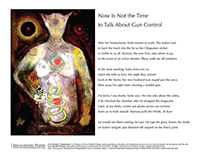 “Bearing Arms: Responding to Guns in American Culture” is the new special “Responses” collection from Broadsided Press. The editors put out a call for visual art and then words in response to those images. All six collaborations – by Maureen Seaton and Jonathan Clyde Frey; Jonathan Baxter and Dixie Salazar; Daniel Aristi and Sandra Cohen; Melissa Fite Johnson and David Kamm; Jennifer Perrine and Kristen Woodward; and Gregory Stapp and Osceola Refetoff – are available for free, full-color download to print, post, and share in your communities. Please do so!
“Bearing Arms: Responding to Guns in American Culture” is the new special “Responses” collection from Broadsided Press. The editors put out a call for visual art and then words in response to those images. All six collaborations – by Maureen Seaton and Jonathan Clyde Frey; Jonathan Baxter and Dixie Salazar; Daniel Aristi and Sandra Cohen; Melissa Fite Johnson and David Kamm; Jennifer Perrine and Kristen Woodward; and Gregory Stapp and Osceola Refetoff – are available for free, full-color download to print, post, and share in your communities. Please do so!
Spread the word!
Blink-Ink – 2017
I have a soft spot in my heart for diners. I’ve spent countless nights at 24-hour restaurants, sipping bad coffee and shoveling down greasy food. At diners, you can sit and write as you study the cast of characters around you, you can escape responsibilities for a while, you can blend in and cease to exist in your sticky booth. The writers in Issue 30 of the pocket-sized Blink-Ink explore the different aspects of diners, all in 50-words or less.
Spread the word!
The American Poetry Journal – December 2017
With 2017 over and two weeks into the new year, it kind of feels like getting through last year was surviving something. Reading the December 2017 issue of The American Poetry Journal, I found myself drawn to poems that consider different types of survival.
Continue reading “The American Poetry Journal – December 2017”
Spread the word!
From the Depths – 2017
Sometimes one feels the need to explore the darkness bubbling below the surface. From the Depths from Haunted Waters Press provides such an experience with poetry and prose that raises goosebumps. This issue features the winners and runners-up of the Haunted Waters Press Fiction & Poetry Open, and the Haunted Waters Press Short Shorts Competition for an added treat.
Spread the word!
Poetry – December 2017
Harriet Monroe founded Poetry magazine in 1912 with the aim to “print the best English verse which is being written today, regardless of where, by whom, or under what theory of art it is written.” Now, over a hundred years since its inception, Poetry has stayed true to Monroe’s vision, following the art in whatever form it takes, lending pages to the words that need them most. Far from blindly crashing into the future, though, Poetry remembers its history. Volume 211 begins with a tribute to Richard Wilbur, who passed this past year.
Spread the word!
Vallum – 2017
This literary magazine is excellent for anyone who enjoys thought provoking poems. In this issue of Vallum, the focus is on “Lies and Duplicity,” and features a number of great poets, a collection of visual art, a conversation with poet Rae Armantrout, and book reviews by various authors.
Spread the word!
Foliate Oak – December 2017
If there were a word to define the December issue of Foliate Oak Literary Magazine, it’d have to be “eclectic.” There truly is no other word I could think of that would adequately describe the nature of the pieces here. The writing ranges widely in style and tone from family-drama fantasy “Vengeance is Born” by Ashley Crisler to “Blister,” Eric Obame’s stark and sobering poem about drug addiction. To be as explicit as possible: eclectic is always a welcome thing in my book.
Spread the word!
The Tishman Review – October 2017
The Tishman Review is a literary magazine chock-full of the literary goods. I mean, the thing is stacked with a stunning array of quality writing.
Spread the word!
2017 Kenyon Review Short Fiction Prize Winners
The January/February 2018 issue of Kenyon Review features winners of their 2017 Short Fiction Prize:
 First Prize
First Prize
“Lionel, For Worse” by David Greendonner [pictured]
Runners Up
“When Do We Worry” by Kimberly King Parsons
“Canto” by Lorain Urban
Each of these works can also be read full-text online here along with commentary on the selections by Judge Lee K. Abbot.
Spread the word!
Lit Mag Covers :: Picks of the Week
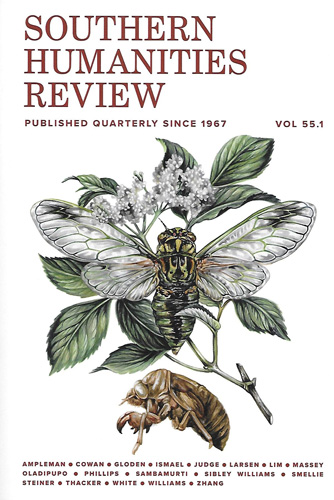 Southern Humanities Review continues celebrating its fifty years in print with issue 51.2, lush cover art by Victoria Marie Bee, & the buzzards came & undressed her (pigment print, 2016).
Southern Humanities Review continues celebrating its fifty years in print with issue 51.2, lush cover art by Victoria Marie Bee, & the buzzards came & undressed her (pigment print, 2016).
 Published by the Department of English and the School of Humanities and Social Sciences at the College of Charleston, the cover image of Crazyhorse Fall 2017 is “Blue Hole,” a digital photograph by Shane Brown.
Published by the Department of English and the School of Humanities and Social Sciences at the College of Charleston, the cover image of Crazyhorse Fall 2017 is “Blue Hole,” a digital photograph by Shane Brown.
Annelisa Leinbach’s vibrant art is featured on the home screen as well as in a portfolio for the Winter 2017 issue of The Writing Disorder online literary magazine.
Spread the word!
American Life in Poetry :: Kim Addonizio
American Life in Poetry: Column 668
BY TED KOOSER, U.S. POET LAUREATE
I’ve had a couple of aquariums (or is the plural aquaria?), but I didn’t take very good care of either one. The glass clouded over with algae, and the fish had to live on whatever they could scrounge because I’d forget to feed them. Some liked eating each other. But here’s a poem (a sonnet!) about an aquarium you can actually see into. The poet, Kim Addonizio, lives in California, and her most recent book is Mortal Trash (W. W. Norton, 2016).
Aquarium
 The fish are drifting calmly in their tank
The fish are drifting calmly in their tank
between the green reeds, lit by a white glow
that passes for the sun. Blindly, the blank
glass that holds them in displays their slow
progress from end to end, familiar rocks
set into the gravel, murmuring rows
of filters, a universe the flying fox
and glass cats, Congo tetras, bristle-nose
pleocostemus all take for granted. Yet
the platys, gold and red, persist in leaping
occasionally, as if they can’t quite let
alone a possibility—of wings,
maybe, once they reach the air? They die
on the rug. We find them there, eyes open in surprise.
We do not accept unsolicited manuscripts. American Life in Poetry is made possible by The Poetry Foundation (www.poetryfoundation.org), publisher of Poetry magazine. It is also supported by the Department of English at the University of Nebraska, Lincoln. Poem copyright ©1994 by Kim Addonizio, “Aquarium,” from The Philosopher’s Club , (BOA Editions, Ltd., 1994). Poem reprinted by permission of Kim Addonizio and the publisher. Introduction copyright ©2017 by The Poetry Foundation. The introduction’s author, Ted Kooser, served as United States Poet Laureate Consultant in Poetry to the Library of Congress from 2004-2006.
Spread the word!
Schuylkill Valley Journal Features Prisoners Poetry
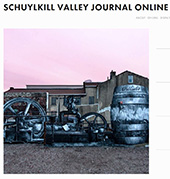 The fall 2017 print issue of Schuylkill Valley Journal includes a special section of poetry written by men imprisoned at Graterford Prison in Philadelphia. Fran B. provides an introduction to the section entitled, “A Poetry Workshop at Graterford Prison,” which begins, “In January, 2017, I started a poetry workshop at Graterford Prison. I had wanted to do this for a long time, several years, and my semi-retirement enabled me to think that I finally had the time to devote to the project.” Fran explains how he worked with the Prison Literacy Project of Pennsylvania and a group called Lifers, Inc. in Graterford Prison to get the workshop started, building a rapport with the inmates, and developing guidelines for their sessions. Fran shares some of the prompts he developed and the responses these elicited from participants.
The fall 2017 print issue of Schuylkill Valley Journal includes a special section of poetry written by men imprisoned at Graterford Prison in Philadelphia. Fran B. provides an introduction to the section entitled, “A Poetry Workshop at Graterford Prison,” which begins, “In January, 2017, I started a poetry workshop at Graterford Prison. I had wanted to do this for a long time, several years, and my semi-retirement enabled me to think that I finally had the time to devote to the project.” Fran explains how he worked with the Prison Literacy Project of Pennsylvania and a group called Lifers, Inc. in Graterford Prison to get the workshop started, building a rapport with the inmates, and developing guidelines for their sessions. Fran shares some of the prompts he developed and the responses these elicited from participants.
Contributing Writer Eric Greinke provides an editorial comment on the works selected: “Although all of the poems that were submitted have merit, this particular group of five poets display special talent and affinity for poetry. Poetic talent can appear anywhere, under any circumstances, because it is the result of the inner human drive to evolve and connect. These five poets transcend situational concerns and rise to a universal level that communicates to our shared humanity. Their poems have in common an emotional intensity but each poet sings with his own unique voice.”
Included are ten poems by five poets: Reginald L., Terrell C., Ben C., Aaron F., and Eduardo R.
Spread the word!
Glimmer Train 2017 Sept/Oct Short Story Award for New Writers Winners
Glimmer Train has just chosen the winning stories for their September/October Short Story Award for New Writers. This competition is held three times a year and is open to all writers whose fiction has not appeared in a print publication with a circulation greater than 5000. The January/February Short Story Award competition has just opened: Short Story Award for New Writers. Glimmer Train’s monthly submission calendar may be viewed here.
 1st place goes to Maxime Kawawa-Beaudan [Photo credit: Scott McCrae] of Berkeley, California, who wins $2500 for “Waiting for Fireworks.” His story will be published in Issue 102 of Glimmer Train Stories. This will be his first major print publication.
1st place goes to Maxime Kawawa-Beaudan [Photo credit: Scott McCrae] of Berkeley, California, who wins $2500 for “Waiting for Fireworks.” His story will be published in Issue 102 of Glimmer Train Stories. This will be his first major print publication.
2nd place goes to Kristen Hamelin Tracey of New York, New York, who wins $500 for “A New World.” Her story will also be published in an upcoming issue, increasing her prize to $700. This will be her first major print publication, as well.
3rd place goes to Oliver Kammeyer of Boston, Massachusetts, who wins $300 for “They’ll Fix That in Turkey.”
A PDF of the Top 25 winners can be found here.
Deadline soon approaching! Family Matters: January 12
Glimmer Train hosts this competition once a year, and first place has been increased to $2500 plus publication in the journal, and 10 copies of that issue. It’s open to all writers for stories about family of any configuration. Most submissions to this category run 1000-5000 words, but can go up to 12,000. Click here for complete guidelines.
Spread the word!
The Whetting Stone
What do you do when the person who promised to stay with you for better and worse, sickness and health leaves? What if they leave by taking their own life? What do you do with the subsequent feelings of betrayal, sadness, and guilt? If you’re Taylor Mali, you write poetry about it. The Whetting Stone, winner of the 2017 Rattle Chapbook Prize, encapsulates Mali’s grief in the aftermath of his wife’s suicide in 2004.
Spread the word!
Good Stock Strange Blood
“where time, they say, ends. Whereas for extending, whereas what you might call a leaking or a wandering. Incalculable lang, incalcable list—what’s spun down the hole. No pulling or leaping up. Blackness, only the din of our existence. Wishing-rod defunct. Hear my voice without echo, always defunct. A stone in hand. A crown in laughter.”
— from “One falls past the lip of some black unknown”
Spread the word!
Most American
“One thing we ought not forget in this America is how our impulse to forget is so strong.” Rilla Askew, Most American
From where I sit right in Shawnee, Oklahoma, I am 41 miles from Rilla Askew, a professor at the University of Oklahoma and author of Most American: Notes From a Wounded Place, a collection of essays on race, violence, history, and Oklahoma. Six months ago, I would not have expected this proximity and would have read this novel from a distance out of curiosity, but disconnected from the Oklahoma Askew memorializes in these pages and connects to the larger American drama.
Spread the word!
Thousand Star Hotel
The other day a seemingly nice older man whom I don’t know exclaimed, “I really don’t care for this hot weather—are you from Japan?” Hell yeah, I should have said. In fact, you know that movie Godzilla? That’s based on my life. It makes me want to vomit radioactively and commit zombie homicide, except in my version there is more than one Asian who survives. Our real conversation was not nearly as fun, but at least it didn’t end in violence. Our daughter overheard this and admonished me: “Don’t talk to strangers, Daddy.” – from “Greek Triptych”
Spread the word!
Volver
Antonio C. Márquez’s Volver is a “memoir” in the truest sense of the word, as its subtitle “A Persistence of Memory” suggests. Beginning in the Pre-World War II borderlands near El Paso, Texas, and moving to Los Angeles, the Midwest, and then all over the world, Volver recounts Márquez’s life and travels, from a poor boy to an established expert in his field who is called on by the government to be a cultural representative in other countries.
Spread the word!
The Book of Donuts
I’ve discovered that the donut is a popular topic for books, but I haven’t noticed an entire book of poems on the subject. The Book of Donuts, edited by Jason Lee Brown and Shanie Latham, helps fill in the gap. The editors have brought together several dozen diverse poets with equally diverse attitudes toward the confection.
Spread the word!
The Walmart Book of the Dead
Lucy Biederman’s newest project The Walmart Book of the Dead has been called “fearsome,” “extraordinary,” and “inventive.” In a work that Biederman calls experimental, she puts together a collection of spells that are meant to remind the reader of the Egyptian Book of the Dead—but in this collection, the tomb is a Walmart.
Spread the word!
World Literature Today Inspires Writing as Resistance
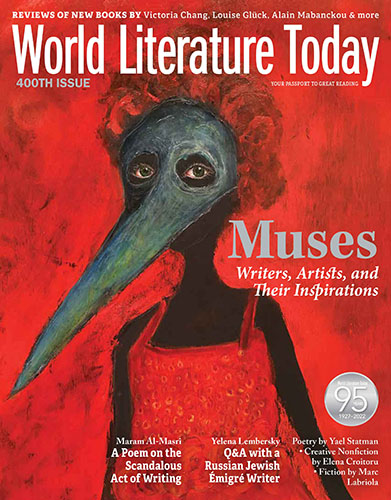 In these turbulent times, we can’t help but wonder just exactly how words do matter, in the sense of “for good” instead of what we see so much of bandied about in terms of knee-jerk thoughtlessness. World Literature Today provides the perspective “Words Matter: Writing as Inspired Resistance” in their January-February 2018 issue. In addition to its regular content is “Treasuring the Tradition of Inspired Resistance”: A Conversation with Maureen Freely by Michelle Johnson, poetry by Iossif Ventura and Anna Maria Carpi, an essay by Liliana Ancalao, three audio poems (online) in Mapuzungun, Spanish, and English, by Liliana Ancalao, a web exclusive interview “Breaking Open Gates: A Conversation with Emmy Pérez,” by Norma Cantú and Chelsea Rodríguez.
In these turbulent times, we can’t help but wonder just exactly how words do matter, in the sense of “for good” instead of what we see so much of bandied about in terms of knee-jerk thoughtlessness. World Literature Today provides the perspective “Words Matter: Writing as Inspired Resistance” in their January-February 2018 issue. In addition to its regular content is “Treasuring the Tradition of Inspired Resistance”: A Conversation with Maureen Freely by Michelle Johnson, poetry by Iossif Ventura and Anna Maria Carpi, an essay by Liliana Ancalao, three audio poems (online) in Mapuzungun, Spanish, and English, by Liliana Ancalao, a web exclusive interview “Breaking Open Gates: A Conversation with Emmy Pérez,” by Norma Cantú and Chelsea Rodríguez.
Readers can access five articles per month without a subscription; WLT is a paying market for writers and encourages subscriptions.
